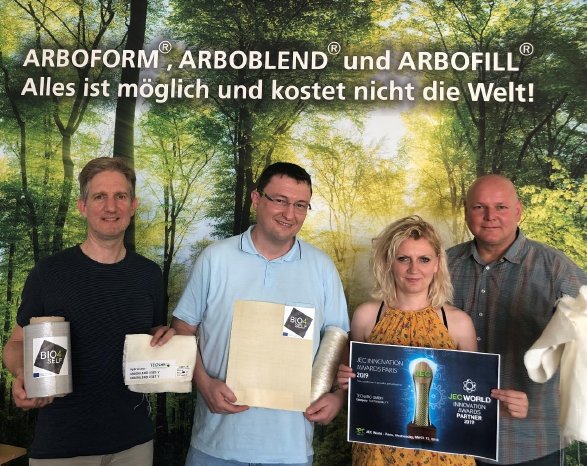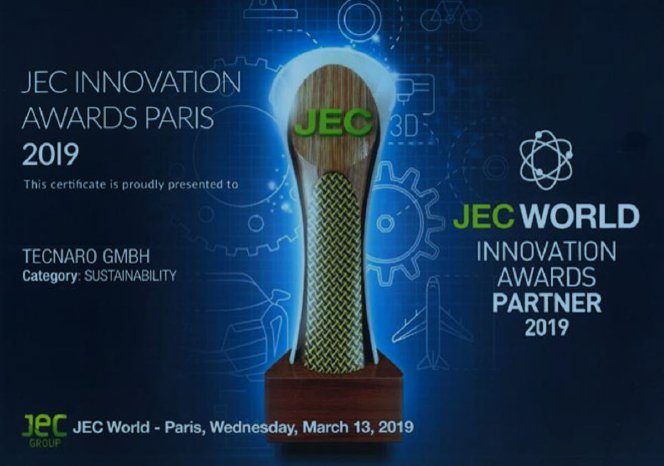More than 20 years ago, TECNARO (TEChnology NAchwachsende ROstoffe) started as a spin-off of the Fraunhofer Gesellschaft with its bioplastics granulates as a lonesome pioneer in the plastics industry and has become an innovation driver of the ever-growing global bio-economy movement.
Research and development has been a core competence of the biotechnology company located in Baden-Württemberg from the very beginning. In 2016, TECNARO participated in the EU project "Bio4Self", part of the European Union's Horizon 2020 research and innovation programme.
Together with its EU "Bio4Self" project partners, TECNARO recently received the international JEC WORLD Innovation Prize for Sustainability 2019 for the most innovative and sustainable development.
TECNARO R&D project managers Erna Muks, Dr. Michael Schweizer and Dr. Dirk Schawaller are certain: "With the self-reinforced bio-composite materials developed in the Bio4Self project for thermoformable, high-strength, biopolymer sheets, the consortium has taken an important step towards circular economy.”
To produce these stable self-reinforced biopolymer composite sheets, two different polylactide-based ARBOBLEND® compounds were spun into multifilament fibers with different melting ranges and were processed into a yarn.
One multifilament consists of a low-melting, impact-resistant ARBOBLEND® formulation and later forms the polymer matrix. The second multifilament serves as a reinforcing fiber and consists of a high-melting, spinnable and stretchable ARBOBLEND® compound with high stiffness. Both multifilaments are then processed into a yarn, the so-called hybrid yarn, in which both reinforcing and matrix fibers are distributed homogeneously. In the next step, these yarns are turned into fabrics or technical textiles. These biopolymer textiles are then processed into sheets in a consolidation press retaining the reinforcing fibers based on the higher melting ARBOBLEND® compound, giving the panel a high strength, while the ARBOBLEND® with the low melting range formulation forms the matrix, resulting finally in a self-reinforced biopolymer composite. The biopolymer composite panels can then be pressed or deep-drawn into various thermoformed parts for a wide range of applications.
Thus, a lightweight, high-strength bio-fiber composite material is created in a spectacular way. As a so-called “single-material composite” it can be completely melted again at the higher melting temperature after its life cycle, without previous separation, and thermally recycled and reused without any problems.
The self-reinforced sheets and components can also be completely industrially biodegraded or thermally CO2 neutral recovered.
This innovation was ”gold” for the jury of experts at JEC World 2019 in Paris!
The managing directors of TECNARO smile "Our slogan - Excellent biopolymer-compounds from Ilsfeld for the world! - was confirmed".
And added: "We are very proud of this outstanding JEC Innovation Prize for Sustainability. We would like to thank all Bio4Self EU project partners for their close and highly professional cooperation. Many thanks to the experts of the EU commission, who focused so early on the right topics.
Our special thanks go to our entire TECNARO team. Everyone is important and everyone is responsible! Because everything runs hand in hand, everyone has insights and everyone contributes, that makes us strong and that is the only way we can meet the requirements of such large-scale projects," said the two TECNARO founders Jürgen Pfitzer and Helmut Nägele.
About JEC World:
The annual JEC World in Paris is the world's largest trade fair for composite materials with 1300 exhibitors. With its conferences, technical and scientific forums, workshops and seminars, it informs more than 40,000 trade visitors from all continents about topics and trends in the composites industry.
About Bio4Self
The basis was the EU project "Bio4Self", which was funded under the funding agreement No. 685 614 from the research and innovation programme European Union's Horizon 2020!
The entire product value chain was represented in the project. From the idea and the proposal, through laboratory research, to the development of cost-effective large-scale production of environmentally friendly, thermoformable self-reinforced bio-composite sheets including business plans with life cycle analysis LCA, associated cost analysis LCC, risk assessment and economic viability analysis.
The top-class research network around the Ilsfeld biotechnology company TECNARO GmbH consisted of international market leaders such as Samsonite NV Belgium, the automotive parts supplier MAIER S.Coop from Spain and the Turkish household appliance manufacturer Arçelik AS.
In order to develop functionalised, stabilised biopolymer compounds, we have optimised the renewable raw material PLA with appropriate additives (partners: Fraunhofer Institute for Chemical Technology ICT (Germany): laboratory-/ technical scale and TECNARO GmbH (Germany): industrial scale). Subsequently, the sustainable biopolymer compounds were meltspun into fibers. This could be divided into the production of the high-melting PLA fibers, which are function as reinforcement fibers (partners: CENTEXBEL CTB (Belgium): laboratory scale and Chemosvit Fibrochem AS (Slovakia): industrial scale) and the low-melting fibers, which later act as matrix (partners: Aachen-Maastricht Institute for Biobased Materials (AMIBM) of the University of Maastricht (Netherlands): laboratory scale and Comfil ApS (Denmark): industrial scale). The filaments with low and high melting ranges are processed into PLA hybrid yarns, which are further woven and compacted into self-reinforced bio-composite panels (partners: Institute for Textile Technology ITA at RWTH Aachen University (Germany): laboratory scale and Comfil ApS (Denmark): industrial scale). This was followed by optimisation of the mechanical properties of the composite panels and all process steps and processing parameters, which were required. Simulations, analysis and characterisation of the bio-composite panels were performed by DTU (partner: Technical University of Denmark DTU (Denmark)). The processes were also simulated and evaluated at AMIBM.
MIRTEC S.A. (Materials Industrial Research and Technology Center)/ Greece: Assessment of hydrolytic stability of compounds and fibres, lifetime prediction of composites, responsibility for quality management.
The Institute IBA (Belgium) and Next Technology Tecnotessile NTT (Italy) were responsible for the investigation of e- -beam treatment for PLA fibers to increase stiffness and thermal stability of filaments via crosslinking and self-cleaning properties of components through photocatalytic additives. Additionally NTT had responsibility for the dissemination activities.
OSM Open Source Management Ltd/ United Kingdom: Business planning guidance and support; dissemination and exploitation services.
The German Steinbeis R-Tech GmbH carried out the LCA, LCC and the risk assessment.
CENTEXBEL successfully organised and coordinated the project.


